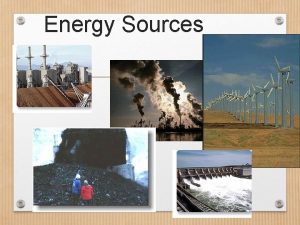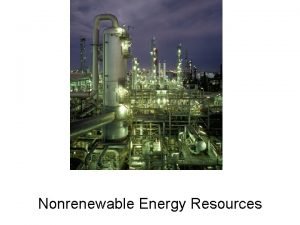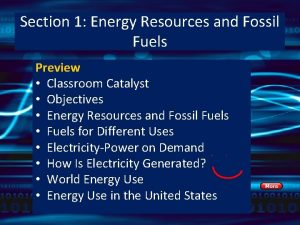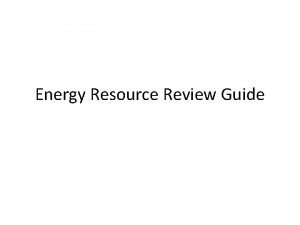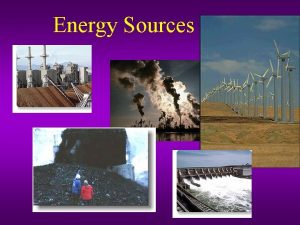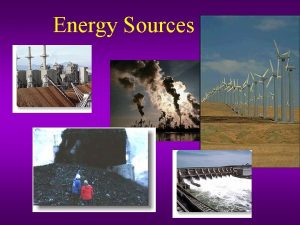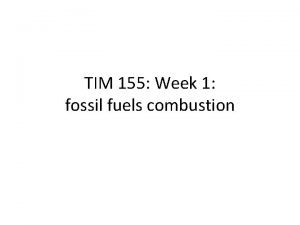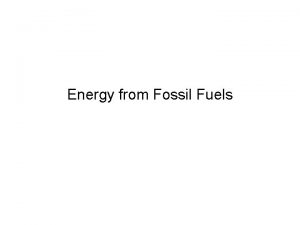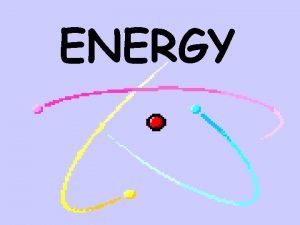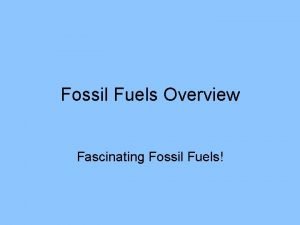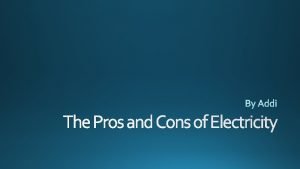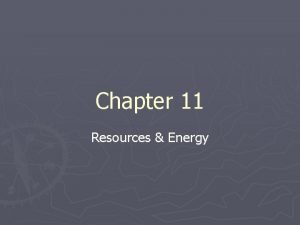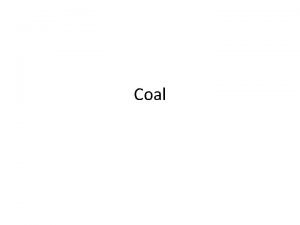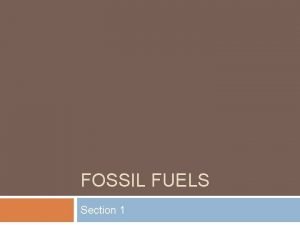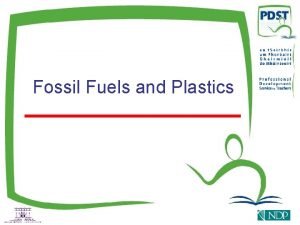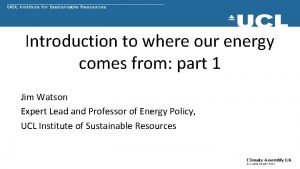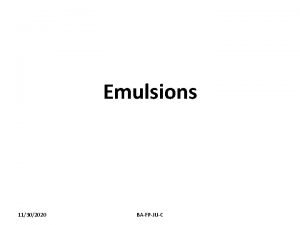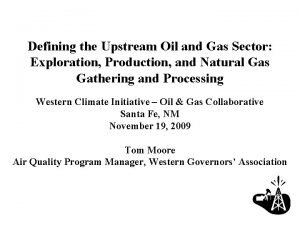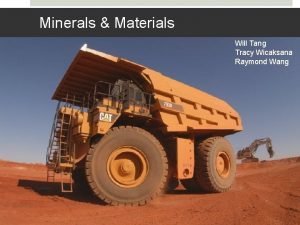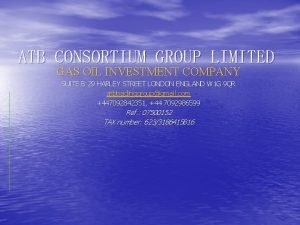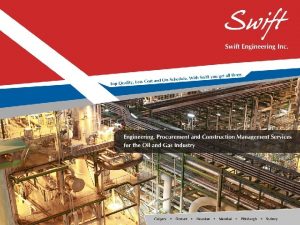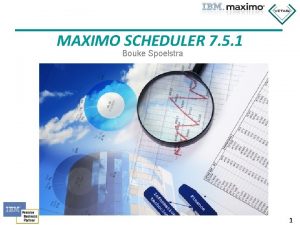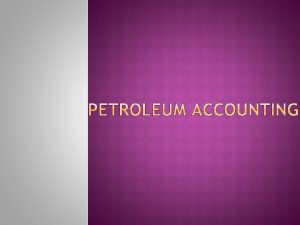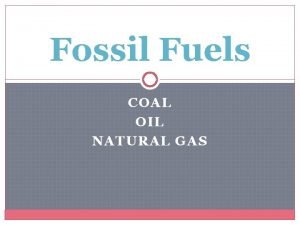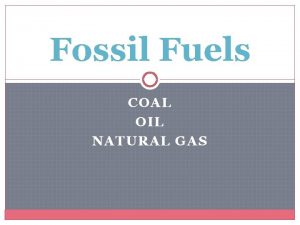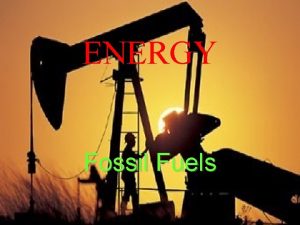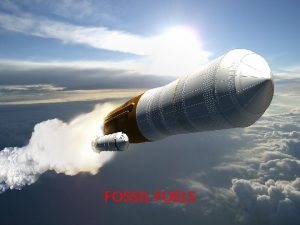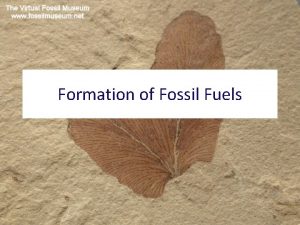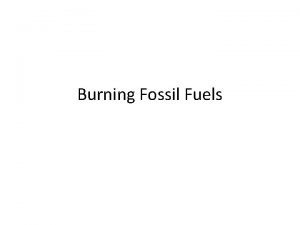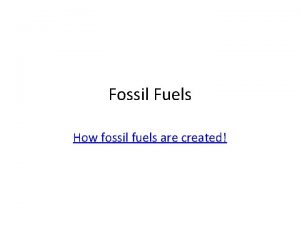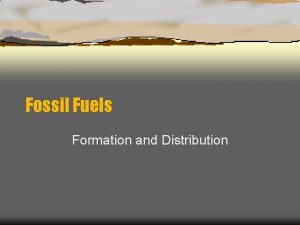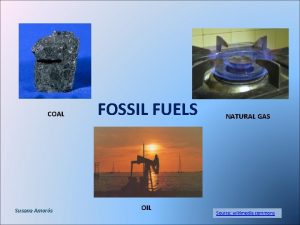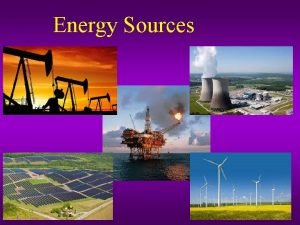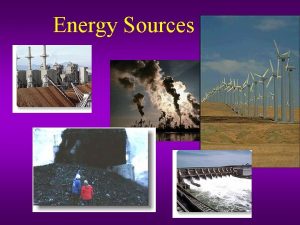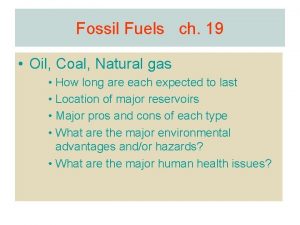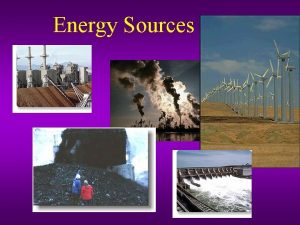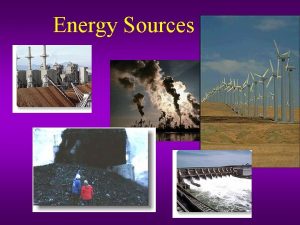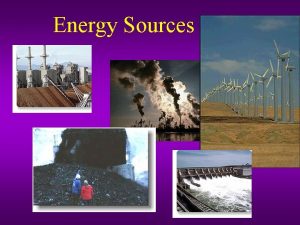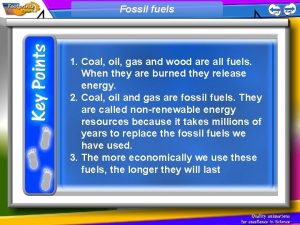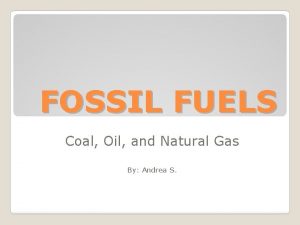Fossil Fuels Coal Oil Gas Coal is crushed






























- Slides: 30

Fossil Fuels: Coal, Oil, & Gas • Coal is crushed into a fine dust, then burned • Oil and gas are burned directly Chemical - Energy Conversions heat – mechanical - electrical

Cost of Fossil Fuels • Set up is cheap • constantly must supply fuel • fuel is non-renewable

Disadvantages • Pollution – produces CO 2 which add to the “greenhouse effect” • Burning coal - produces sulphur dioxide (a gas that contributes to acid rain) • Mining coal destroys large areas of the landscape. • Coal-fired power stations causes large area of countryside next to be covered with piles of coal.

Advantages • Very large amounts of electricity can be generated in one place cheaply • Transporting oil and gas to the power stations is easy. • Gas-fired power stations are very efficient. • Can build a fossil-fuelled power station almost anywhere

Solar Power: Energy from the Sun Solar Cells: • • called "photovoltaic", "PV" or "photoelectric" cells convert light directly into electricity. stores energy in batteries Energy Conversions Light energy - chemical energy - electrical energy

Solar water heating: • where heat from the Sun is used to heat water in glass panels on your roof Energy Conversion Light energy - heat

Cost of Solar Power • Equipment is inexpensive to heat things • Equipment is expensive if used for electricity • fuel costs cheap • unlimited supply of free fuel

Advantages of Solar Energy • Solar energy is free – • it needs no fuel and produces no waste or pollution. • In sunny countries, solar power can be used where there is no easy way to get electricity to a remote place. • Good for low-power uses (solar powered garden lights and battery chargers)

Disadvantages • Doesn't work at night. • Solar cells are very expensive • unreliable unless you're in a very sunny climate. • need a large area of solar panels to get a decent amount of power.

Nuclear Power energy from splitting Uranium atoms • Uranium atoms split to give off heat Chemical energy Energy Conversions - heat - mechanical - electrical

Cost of Nuclear Power • Very expensive to build a nuclear power plant • fuel is cheap • very expensive to run a nuclear power plant because of the safety issues

Advantages • Nuclear power costs about the same as coal • Does not produce smoke or carbon dioxide • Produces huge amounts of energy from small amounts of fuel. • Produces small amounts of waste. • Nuclear power is reliable.

Disadvantages • waste is radioactive and very, very dangerous. • waste is stored for thousands of years and must be kept safe from earthquakes, flooding, terrorists, etc • a nuclear accident is a major disaster. • fuel is nonrenewable

Wind power • wind moves a turbine Energy Conversions - Kinetic energy - mechanical energy - electrical energy

Cost of Wind Power • fuel is free • cost is building the turbines

Advantages • wind farms need no fuel - renewable • Produces no waste or greenhouse gases. • The land beneath can usually still be used for farming. • Wind farms can be tourist attractions. • A good method of supplying energy to remote areas.

Disadvantages • The wind is not always predictable – need a windspeed of 25 km/h • wind farms are often near the coast, where land is expensive. • covering the landscape with these towers is unsightly. • Can kill birds - migrating flocks tend to like strong winds. • Can affect television reception • Can be noisy. Wind generators make a constant, low, "swooshing" noise

Tidal power Energy from the Sea • tides move a turbine • energy is from gravity of the moon Energy Conversions Gravity from moon - mechanical - electrical

Cost of Tidal Power Station • expensive to build • damages the environment more • fuel is free Offshore Turbines • cheaper to build • fuel is free • less environmental impact

Advantages • Once you've built it, tidal power is free. • produces no greenhouse gases or other waste. • needs no fuel – renewable energy resource • It produces electricity reliably. • Not expensive to maintain. • Tides are totally predictable. • Offshore turbines and vertical-axis turbines are not as expensive to build and do not have a large environmental impact.

Disadvantages • A barrage across an estuary is very expensive to build, and affects a very wide area - the environment is changed for many miles upstream and downstream. • There are few suitable sites for tidal barrages. • Only provides power for around 10 hours each day, when the tide is actually moving in or out.

Hydroelectric Power: Energy from Falling Water • has been used for thousands of years, mainly to grind corn. • water turns a wheel Energy Conversions Kinetic energy - mechanical energy - electrical energy

• Water flows through tunnels in the dam, to turn turbines and drive generators. • dam is thicker at the bottom than at the top, because of the pressure When it was first built, the huge "Hoover Dam", on the Colorado river, supplied much of the electricity for the city of Las Vegas

Cost of Hydroelectric Power • expensive to build dams • fuel is free • cost to run a dam is small

Advantages • Once the dam is built, the energy is virtually free – renewable energy • No waste or pollution produced. • Much more reliable than wind, solar or wave power. • Water can be stored above the dam ready to cope with peaks in demand. • Hydro-electric power stations can increase to full power very quickly • Electricity can be generated constantly.

Disadvantages • The dams are very expensive to build. (many dams are also used for flood control or irrigation) • Building a large dam will flood a very large area upstream • Finding a suitable site can be difficult - the impact on residents and the environment may be unacceptable. • Water quality and quantity downstream can be affected, which can have an impact on plant life.

Geothermal: Heat from Underground • Hot rocks underground heat water to produce steam. • Holes are drilled down to the hot region, steam comes up, is purified and used to drive turbines, which drive electric generators. • There may be natural "groundwater" in the hot rocks anyway, or we may need to drill more holes and pump water down to them.

Cost of Geothermal Energy • can be expensive to build • inexpensive to operate • fuel is free - renewable

Advantages • does not produce any pollution, and does not contribute to the greenhouse effect. • minimal impact on the environment • No fuel is needed.

Disadvantages • Not many places where you can build a geothermal power station. • geothermal site may "run out of steam", perhaps for decades. • Hazardous gases and minerals may come up from underground, and can be difficult to safely dispose of.
 The origin of oil student worksheet answers
The origin of oil student worksheet answers Benefits of using fossil fuels
Benefits of using fossil fuels Advantages and disadvantages of nonrenewable energy
Advantages and disadvantages of nonrenewable energy Deposit
Deposit Fossil fuels include
Fossil fuels include Advantage of fossil fuels
Advantage of fossil fuels Benefits of using fossil fuels
Benefits of using fossil fuels Fossil fuel energy advantages and disadvantages
Fossil fuel energy advantages and disadvantages Fossil fuels formula
Fossil fuels formula What are the environmental impacts of fossil fuels
What are the environmental impacts of fossil fuels Energy transformation of alarm clock
Energy transformation of alarm clock Fossil fuels include
Fossil fuels include Pros and cons of electrical energy
Pros and cons of electrical energy Fossil fuels
Fossil fuels Similarities between biofuels and fossil fuels
Similarities between biofuels and fossil fuels What the most abundant fossil fuel
What the most abundant fossil fuel Coal is a solid fossil fuel formed from plant remains
Coal is a solid fossil fuel formed from plant remains Coal oil
Coal oil Coal, oil
Coal, oil Primary emulsion formula
Primary emulsion formula Come let's talk
Come let's talk Squidgain
Squidgain Crushed mouse brains as toothpaste
Crushed mouse brains as toothpaste Oil and gas
Oil and gas Oil and gas company
Oil and gas company Atb oil and gas
Atb oil and gas Oil & gas engineering services
Oil & gas engineering services Maximo asset management scheduler
Maximo asset management scheduler Oil and gas free zone authority recruitment
Oil and gas free zone authority recruitment Full cost method oil and gas
Full cost method oil and gas Maximo scheduler run optimization
Maximo scheduler run optimization

